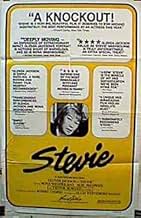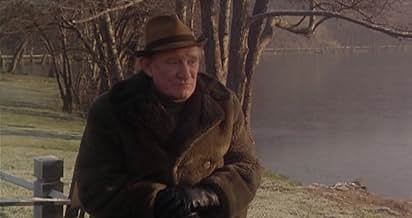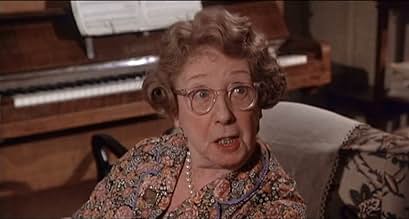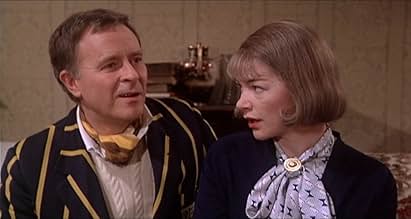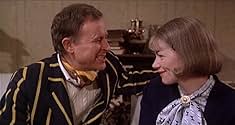This biographical film has Glenda Jackson portraying a British poet with emotional problems.This biographical film has Glenda Jackson portraying a British poet with emotional problems.This biographical film has Glenda Jackson portraying a British poet with emotional problems.
- Nominated for 1 BAFTA Award
- 8 wins & 4 nominations total
Featured reviews
Literate, lovely, sad film about the British poet/writer Stevie Smith with splendid performances by Glenda Jackson as Stevie and Mona Washbourne as the "lion aunt." Stagy, yes, but filled with love and wit and great wisdom.
The narrative follows the adult years of the eccentric poet in her suburban London home she shares with her aunt. Her workaday like is a background to her domestic life with flashbacks of school, a failed love, and death ... a major theme in her writing.
But rather than being gloomy, the film points out the joys of a life even if unfulfilled by husband and children. Jackson enacts many of Stevie's poems as a counterpoint to her own life, and she is quite superb.
Mona Washbourne is excellent and endearing as the aging aunt who really doesn't understand the Bohemian life of her gifted niece. Yet they have a wonderful life together. The domestic scenes of the simple joys of conversation and good sherry are wondrous.
Alec McCowen is the lost suitor. Trevor Howard is the narrator who wanders through the story.
A pity this is not available on DVD. A lovely film for the intelligent viewer.
The narrative follows the adult years of the eccentric poet in her suburban London home she shares with her aunt. Her workaday like is a background to her domestic life with flashbacks of school, a failed love, and death ... a major theme in her writing.
But rather than being gloomy, the film points out the joys of a life even if unfulfilled by husband and children. Jackson enacts many of Stevie's poems as a counterpoint to her own life, and she is quite superb.
Mona Washbourne is excellent and endearing as the aging aunt who really doesn't understand the Bohemian life of her gifted niece. Yet they have a wonderful life together. The domestic scenes of the simple joys of conversation and good sherry are wondrous.
Alec McCowen is the lost suitor. Trevor Howard is the narrator who wanders through the story.
A pity this is not available on DVD. A lovely film for the intelligent viewer.
There could never be a great film about Stevie Smith; the poet is simply too small, silly and self-absorbed, like her work - just the kind of poetry that seems to win awards, as hers did twice.
But smallness is the strength of this film, and its economy has been praised by many. Most of the action (mainly talk, in fact) takes place in one modest suburban front parlour, between Stevie and her deeply unpoetic Yorkshire aunt, played by Mona Washbourne, who comes a little too close to caricature, and does not quite measure up to Glenda Jackson, Trevor Howard or Alec McCowen, who comprise the rest of the minimal cast. Even at that, the two males are only allowed on-board as fringe-characters, McCowen as the hopeful young suitor Freddy, doomed to disappointment, and Howard as a mystery figure, known only as The Man, presumably an ex-lover, who recites a few of her poems with deep sincerity.
These poems display little virtue (rather like a poor man's Edith Sitwell), but they reveal an unusually deep preoccupation with death, alongside a confused and childish protest against middle-class values, as deeply embedded in the aunt's character. Her coining of the phrase 'Not waving but drowning' may yet survive as her epitaph.
Jackson carries full conviction as Stevie, having to act the same person from schooldays onwards, so we don't always know what age and stage we're at. She talks as though she's still in her teens when she visits Berlin with a German boyfriend at the beginning of the Nazi era, by which time Stevie would have been into her thirties.
Meanwhile she treats death as another character in the story, apparently welcoming the certainty of his arrival, and Howard reports that she died, unable to speak, but circling one word on a sheet of paper. The word was 'Death'.
But smallness is the strength of this film, and its economy has been praised by many. Most of the action (mainly talk, in fact) takes place in one modest suburban front parlour, between Stevie and her deeply unpoetic Yorkshire aunt, played by Mona Washbourne, who comes a little too close to caricature, and does not quite measure up to Glenda Jackson, Trevor Howard or Alec McCowen, who comprise the rest of the minimal cast. Even at that, the two males are only allowed on-board as fringe-characters, McCowen as the hopeful young suitor Freddy, doomed to disappointment, and Howard as a mystery figure, known only as The Man, presumably an ex-lover, who recites a few of her poems with deep sincerity.
These poems display little virtue (rather like a poor man's Edith Sitwell), but they reveal an unusually deep preoccupation with death, alongside a confused and childish protest against middle-class values, as deeply embedded in the aunt's character. Her coining of the phrase 'Not waving but drowning' may yet survive as her epitaph.
Jackson carries full conviction as Stevie, having to act the same person from schooldays onwards, so we don't always know what age and stage we're at. She talks as though she's still in her teens when she visits Berlin with a German boyfriend at the beginning of the Nazi era, by which time Stevie would have been into her thirties.
Meanwhile she treats death as another character in the story, apparently welcoming the certainty of his arrival, and Howard reports that she died, unable to speak, but circling one word on a sheet of paper. The word was 'Death'.
This is a wonderful film. It is not perfect; not many man-made artifacts are. However, if you have seen any film of Stevie Smith, you will realise how well Glenda Jackson captures her spirit, and especially her appearance. The claustrophobic scenes (mostly in the living-room of her very ordinary house) enhance this impression. The music and the interspersed commentary by Trevor Howard detach us from the story so we can be objective. Yes, it is sad; anyone who reads Smith's poetry knows it is sad, macabre and eccentric. The only real drawback is Mona Washbourne's portrayal of the aunt, not apparently true to life. Shame, as she is the warmest of the characters in the film. I only wish they would release it on dvd as video does not do it justice.
For a thoughtful, literate, positive essay on the film, see Ed Hirsch in American Poetry Review (Jul/Aug 2000): 32-37: ""It's deeply fitting that the last words of the film are the words of Stevie's final poem ["Come Death (a)," read by Trevor Howard]. They fill the mind, the theater, with their faithful summons, their fatal timely music.""
Reading the reviews and feeling like I feel, I want to keep this film alive by adding a comment here.
I saw this years ago and never forgot it. I was (and am) a Glenda Jackson fan - although we are both of age now. The story of Stevie Smith was new to me at the time. What a wonderful way to get to know her writings ! It blew me way. I've read much of her since thanks to this film. I found it sublime. Much thanks to Mona Washburn and Trevor Howard (both died in 1988), but mostly to Glenda Jackson. I wish I could see it again. Can anybody show me where to get it ? Dl or otherwise. I'm grateful that I have the vinyl LP so I can listen to it from time to time :)
I saw this years ago and never forgot it. I was (and am) a Glenda Jackson fan - although we are both of age now. The story of Stevie Smith was new to me at the time. What a wonderful way to get to know her writings ! It blew me way. I've read much of her since thanks to this film. I found it sublime. Much thanks to Mona Washburn and Trevor Howard (both died in 1988), but mostly to Glenda Jackson. I wish I could see it again. Can anybody show me where to get it ? Dl or otherwise. I'm grateful that I have the vinyl LP so I can listen to it from time to time :)
Did you know
- TriviaThe film was given a very limited release in the USA in late 1978, but only on the West Coast. Over two years later, it was shown theatrically on the East Coast and proved a big hit with critics, going on to win many awards, including 2 acting awards from the New York Film Critics.
- Quotes
Stevie Smith: Agatha Christie is so deadly serious in English... but in French, she's so delightfully funny! Je m'apelle Hercule Poirot, un detective. Her murders are so polite!
Details
- Runtime
- 1h 42m(102 min)
- Sound mix
- Aspect ratio
- 1.78 : 1
Contribute to this page
Suggest an edit or add missing content

